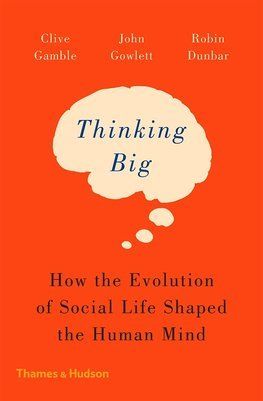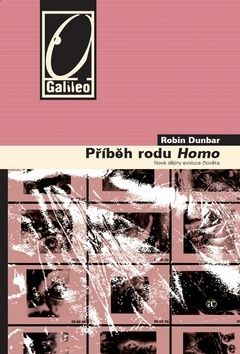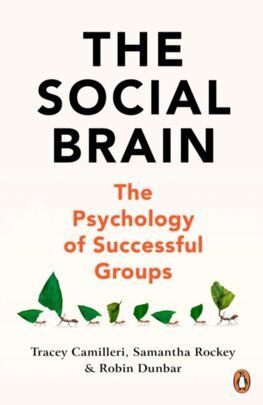Robin Dunbar
autor
Thinking Big
When and how did the brains of our hominin ancestors become human minds? When and why did our capacity for language or art, music and dance evolve? It is the contention of this pathbreaking and provocative book that it was the need for early humans to live in ever-larger social groups, and to maintain social relations over ever-greater distances – the ability to ‘think big’ – that drove the enlargement of the human brain and the development of the human mind. This ‘social brain hypothesis’, put forward by evolutionary psychologists such as Robin Dunbar, one of the authors of this book, can be tested against archaeological and fossil evidence, as archaeologists Clive Gamble and John Gowlett show in the second part of Thinking Big. Along the way, the three authors touch on subjects as diverse and diverting as the switch from finger-tip grooming to vocal grooming or the crucial importance of making fire for the lengthening of the social day. As this remarkable book shows, it seems we still inhabit social worlds that originated deep in our evolutionary past – by the fireside, in the hunt and on the grasslands of Africa.
Na sklade 1Ks
12,30 €
12,95 €
Příběh rodu Homo
Poslední desetiletí byla z hlediska vědních oborů zabývajících se evolucí člověka doslova převratná. Najednou jsme se ocitli uprostřed „rodinného kruhu“ velkých afrických lidoopů a mnohdy není snadné se s touto skutečností vyrovnat. Avšak jsou naše pocity, vzorce chování a překážky, s nimiž se v rámci rodičovství či partnerských vztahů potýkáme, skutečně natolik výlučné? Kde vlastně hledat počátky všeho, co jsme takříkajíc dostali do vínku, a co z nás přes veškerou naši nedostatečnost činí druh tak jedinečný a životaschopný? Do jaké míry je kultura skutečně hájemstvím člověka a kdy a proč se zrodil zpěv, jazyk a náboženství? Zábavnou, nanejvýš poutavou a běžnému čtenáři přístupnou formou nám jeden z nejvýznamnějších evolučních psychologů dává nahlédnout do hlubin lidské mysli a snaží se zodpovědět otázku, co to vlastně znamená být člověkem.
Vypredané
10,05 €
10,58 €
Science of Love and Betrayal
Falling in love is one of the strangest things we can do - and one of the things that makes us uniquely human. But what happens to our brains when our eyes meet across a crowded room? Why do we kiss each other, forget our friends, seek a 'good sense of humour' in Lonely Hearts adverts and try (and fail) to be monogamous? How are our romantic relationships different from our relationships with friends, family or even God? Can science help us, or are we better off turning back to the poets? Basing his arguments on new and experimental scientific research, Robin Dunbar explores the psychology and ethology of romantic love and how our evolutionary programming still affects our behaviour. Fascinating and illuminating, witty and accessible, "The Science of Love and Betrayal" is essential reading for anyone who's ever wondered why we fall in love and what on earth is going on when we do.
Vypredané
11,39 €
11,99 €
Human Evolution
What makes us human? How did we develop language, thought and culture? Why did we survive, and other human species fail? Robin Dunbar is an evolutionary psychologist and former director of the Institute of Cognitive and Evolutionary Anthropology at Oxford University. His acclaimed books include How Many Friends Does One Person Need? and Grooming, Gossip and the Evolution of Language, described by Malcolm Gladwell as 'a marvellous work of popular science.'
Vypredané
9,98 €
10,50 €
How Religion Evolved
When did humans develop spiritual thought? What is religion's evolutionary purpose? And in our increasingly secular world, why has it endured?
Every society in the history of humanity has lived with religion. In How Religion Evolved, evolutionary psychologist Professor Robin Dunbar tracks its origins back to what he terms the 'mystical stance' - the aspect of human psychology that predisposes us to believe in a transcendent world, and which makes an encounter with the spiritual possible. As he explores world religions and their many derivatives, as well as religions of experience practised by hunter-gatherer societies since time immemorial, Dunbar argues that this instinct is not a peculiar human quirk, an aberration on our otherwise efficient evolutionary journey. Rather, religion confers an advantage: it can benefit our individual health and wellbeing, but, more importantly, it fosters social bonding at large scale, helping hold fractious societies together. Dunbar suggests these dimensions might provide the basis for an overarching theory for why and how humans are religious, and so help unify the myriad strands that currently populate this field.
Drawing on path-breaking research, clinical case studies and fieldwork from around the globe, as well as stories of charismatic cult leaders, mysterious sects and lost faiths, How Religion Evolved offers a fascinating and far-reaching analysis of this quintessentially human impulse - to believe.
Vypredané
27,08 €
28,50 €
Barátok
A barátok jobban befolyásolják életminőségünket, mint gondolnánk. Robin Dunbar világhírű brit antropológus és evolúciós pszichológus könyve a minket körülvevő rokoni és baráti kapcsolati háló rétegeiről, a szűkebb-tágabb baráti körök méretének elménk által szabott határairól folytatott több évtizedes kutatást foglalja össze. A népszerű elmélet szerint mintegy 150 embert tudunk ismerősként fejben tartani - ez az úgynevezett Dunbar-szám.
Milyen támaszt várhatunk a barátainktól, és mennyi ideig marad meg egy barátság energiabefektetés nélkül? Miben más a rokonok szerepe? Különbözik-e az online világ a szemtől szembeni interakcióktól? Megbízhatunk-e idegenekben, hogy új barátokra tegyünk szert? Hány fős asztalnál tudunk értelmesen beszélgetni? Milyen neurobiológiai alapja van a férfiak és a nők eltérő barátkozási stílusának? A tudományos kutatásokból származó felismeréseket személyes tapasztalatokkal, a különböző kultúrák sajátosságaival vegyítve a Barátok pszichológiai, antropológiai és genetikai ismereteket ötvöz egyetlen varázslatos szövedékbe, lehetővé téve számunkra, hogy felismerjük szociális kapcsolataink hihetetlen komplexitását.
Vypredané
16,85 €
17,74 €
The Social Brain
How many people does the ideal team contain? How do groups bond, earn trust and forge shared identities? How can leaders build environments adaptable enough to respond to shocks and still enable people to thrive together? How can you feel close to people if your only point of contact is a phone or a computer?
In The Social Brain leading experts from the worlds of evolutionary psychology and business management come together to offer a primer on great team working. They explain what size groups work and how to shape them according to the nature of the task at hand. They offer practical hints on how to diffuse tensions and encourage cooperation. And they demonstrate the vital importance of balancing unity and the need for different views and outlooks. By explaining precisely how the 'social brain' works, they show how human groups function and how to create great, high-performing teams.









